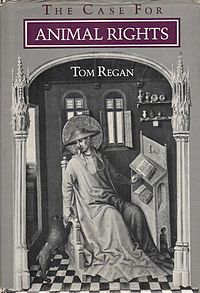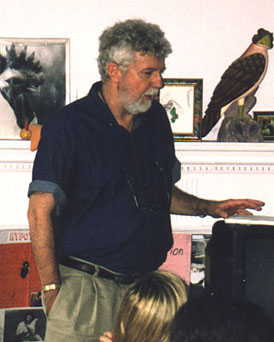
Animal welfare is the well-being of non-human animals. Formal standards of animal welfare vary between contexts, but are debated mostly by animal welfare groups, legislators, and academics. Animal welfare science uses measures such as longevity, disease, immunosuppression, behavior, physiology, and reproduction, although there is debate about which of these best indicate animal welfare.

Gary Lawrence Francione is an American academic in the fields of law and philosophy. He is Board of Governors Professor of Law and Katzenbach Scholar of Law and Philosophy at Rutgers University in New Jersey. He is also a visiting professor of philosophy at the University of Lincoln (UK) and honorary professor of philosophy at the University of East Anglia (UK). He is the author of numerous books and articles on animal ethics.

The animal rights (AR) movement, sometimes called the animal liberation, animal personhood, or animal advocacy movement, is a social movement that seeks an end to the rigid moral and legal distinction drawn between human and non-human animals, an end to the status of animals as property, and an end to their use in the research, food, clothing, and entertainment industries.

Animal rights is the philosophy according to which many or all sentient animals have moral worth independent of their utility to humans, and that their most basic interests—such as avoiding suffering—should be afforded the same consideration as similar interests of human beings. Broadly speaking, and particularly in popular discourse, the term "animal rights" is often used synonymously with "animal protection" or "animal liberation". More narrowly, "animal rights" refers to the idea that many animals have fundamental rights to be treated with respect as individuals—rights to life, liberty, and freedom from torture that may not be overridden by considerations of aggregate welfare.
Bob Linden is the creator, executive producer and host of Go Vegan Radio, a one-hour talk radio program dedicated to topics including veganism, animal rights and environmentalism. Linden is also an events organizer and professional promoter. Linden played a major role in the conception, development and promotion of Vegan Earth Day Events, San Diego Fall-Fest, which he has also emceed. He has served as Media Coordinator for the Farm Animal Rights Movement (FARM) and the Great American Meatout.
Humane Farm Animal Care is a non-profit organization established to promote and administer its certification and labeling program, Certified Humane Raised & Handled, for meat, dairy, eggs and poultry raised under its animal care standards in the US. It is governed by a board of directors and retains a scientific committee which includes scientists and veterinarians. The organization is endorsed by the American Society for the Prevention of Cruelty to Animals.

Abolitionism or abolitionist veganism is the animal rights based opposition to all animal use by humans. Abolitionism intends to eliminate all forms of animal use by maintaining that all sentient beings, humans or nonhumans, share a basic right not to be treated as properties or objects. Abolitionists emphasize that the production of animal products requires treating animals as property or resources, and that animal products are not necessary for human health in modern societies. Abolitionists believe that everyone who can live vegan is therefore morally obligated to be vegan.

Roger Yates is an English lecturer in sociology at University College Dublin and the University of Wales, specialising in animal rights. He is a former executive committee member of the British Union for the Abolition of Vivisection (BUAV), a former Animal Liberation Front (ALF) press officer, and a co-founder of the Fur Action Group.

The Case for Animal Rights is a 1983 book by the American philosopher Tom Regan, in which the author argues that at least some kinds of non-human animals have moral rights because they are the "subjects-of-a-life," and that these rights adhere to them whether or not they are recognized. The work is considered an important text within animal rights theory.
Animal advocacy may refer to:

Robert Garner is a British political scientist, political theorist, and intellectual historian. He is a Professor Emeritus in the politics department at the University of Leicester, where he has worked for much of his career. Before working at Leicester, he worked at the University of Exeter and the University of Buckingham, and studied at the University of Manchester and the University of Salford.

Norm Phelps was an American animal rights activist, vegetarian and writer. He was a founding member of the Society of Ethical and Religious Vegetarians (SERV), and a former outreach director of the Fund for Animals. He authored four books on animal rights: The Dominion of Love: Animal Rights According to the Bible (2002), The Great Compassion: Buddhism and Animal Rights (2004), The Longest Struggle: Animal Advocacy from Pythagoras to PETA (2007), and Changing the Game: Animal Liberation in the Twenty-first Century (2015).

Animals, Property, and the Law (1995) is a book by Gary Francione, Distinguished Professor of Law and Nicholas deB. Katzenbach Scholar of Law and Philosophy at Rutgers School of Law–Newark. The book was the first extensive jurisprudential treatment of animal rights.

Why We Love Dogs, Eat Pigs, and Wear Cows: An Introduction to Carnism is a 2009 book by American social psychologist Melanie Joy about the belief system and psychology of meat eating, or "carnism". Joy coined the term carnism in 2001 and developed it in her doctoral dissertation in 2003. Carnism is a subset of speciesism, and contrasts with ethical veganism, the moral commitment to abstain from consuming or using meat and other animal products. In 2020, an anniversary edition of the book was published by publisher Red Wheel.

An Introduction to Animals and Political Theory is a 2010 textbook by the British political theorist Alasdair Cochrane. It is the first book in the publisher Palgrave Macmillan's Animal Ethics Series, edited by Andrew Linzey and Priscilla Cohn. Cochrane's book examines five schools of political theory—utilitarianism, liberalism, communitarianism, Marxism and feminism—and their respective relationships with questions concerning animal rights and the political status of (non-human) animals. Cochrane concludes that each tradition has something to offer to these issues, but ultimately presents his own account of interest-based animal rights as preferable to any. His account, though drawing from all examined traditions, builds primarily upon liberalism and utilitarianism.

Alasdair Cochrane is a British political theorist and ethicist who is currently Professor of Political Theory in the Department of Politics and International Relations at the University of Sheffield. He is known for his work on animal rights from the perspective of political theory, which is the subject of his two books: An Introduction to Animals and Political Theory and Animal Rights Without Liberation. His third book, Sentientist Politics, was published by Oxford University Press in 2018. He is a founding member of the Centre for Animals and Social Justice, a UK-based think tank focused on furthering the social and political status of nonhuman animals. He joined the Department at Sheffield in 2012, having previously been a faculty member at the Centre for the Study of Human Rights, London School of Economics. Cochrane is a Sentientist. Sentientism is a naturalistic worldview that grants moral consideration to all sentient beings.

Animal Rights Without Liberation: Applied Ethics and Human Obligations is a 2012 book by the British political theorist Alasdair Cochrane, in which it is argued that animal rights philosophy can be decoupled from animal liberation philosophy by the adoption of the interest-based rights approach. Cochrane, arguing that there is no reason that (nonhuman) animals should be excluded from justice, adopts Joseph Raz's account of interest rights and extends it to include animals. He argues that sentient animals possess a right not to be made to suffer and a right not to be killed, but not a right to freedom. The book's chapters apply Cochrane's account to a number of interactions between humans and animals; first animal experimentation, then animal agriculture, the genetic engineering of animals, the use of animals in entertainment and sport, the relationship of animals to environmental practices and the use of animals in cultural practices.

Rain Without Thunder: The Ideology of the Animal Rights Movement is a 1996 book by American legal scholar Gary L. Francione. The basic premise of the book is that there is a fundamental difference between those that call for animal welfare reform and those that call for the complete abolition of animal use, and that animals have a fundamental right to not be exploited.
Satya was an American monthly magazine which covered vegetarianism, animal rights, environmentalism and social justice issues. It was co-founded by Beth Gould and Martin Rowe in 1994 and released its final issue in 2007. Scholar Gary Francione says Satya became the main journal that promoted animal welfare after the demise of The Animals' Agenda in 2002.












